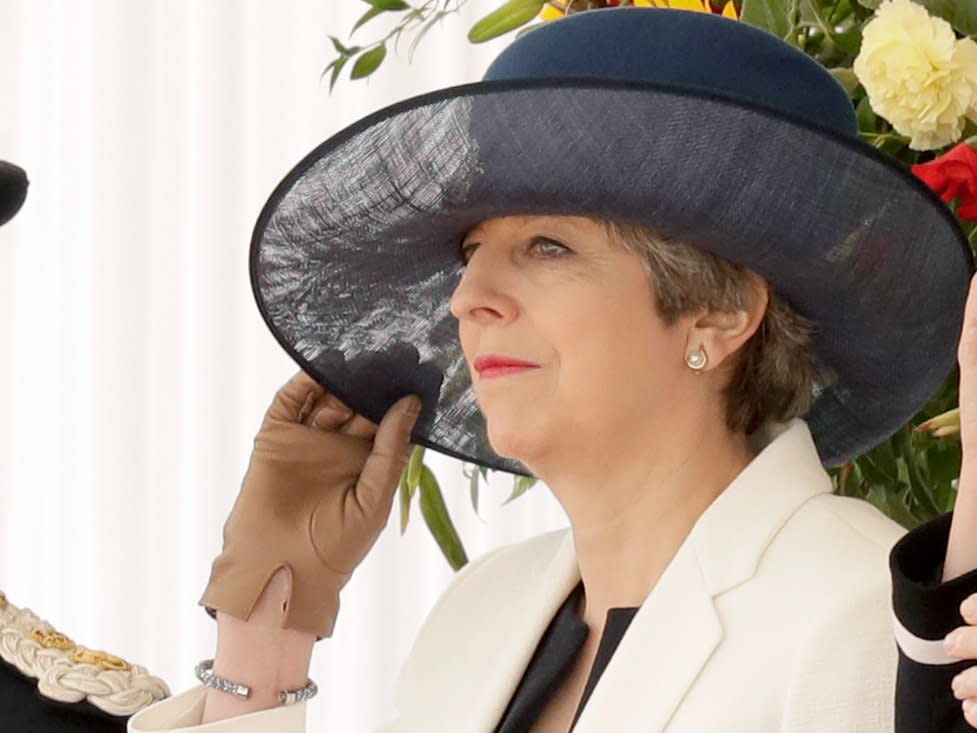Theresa May's handlers blocked her from meeting CEOs for a year, which explains why she was so tone deaf when it came to business

Photo by Matt Dunham - WPA Pool/Getty Images
LONDON — Prime Minister Theresa May was blocked from meeting business leaders for a year by her former staff chiefs Nick Timothy and Fiona Hill, according to the Financial Times. When she did meet executives from the real world outside Westminster, she often silenced them with "an icy glare," the FT says.
Only yesterday did she begin a schedule of regularly meeting company CEOs to get the temperature of UK industry.
That goes a long way to explaining why this Conservative government has been so tone deaf on basic issues such as how international trade works, how investment flows into Britain, and the small matter of where jobs come from.
Normally, you can rely on a Conservative government to be close to big business and the banks. But this is what happened inside Downing Street over the last year, the FT says:
"... before the election she was shielded from company bosses by her co-chiefs of staff Nick Timothy and Fiona Hill.
Mr Timothy was the architect of efforts to remodel the Conservatives as the party of 'working families', and concluded that Mrs May needed to end the impression that the Tories were the political wing of Britain’s business elite. He and Ms Hill quit after the election.
The extent of Mrs May’s efforts to distance herself from corporate Britain was highlighted when she disbanded last year her predecessor David Cameron’s business advisory group. A series of policies seen as 'anti-business' followed.
Her main interaction with business was at several Downing Street dinners, at which chief executives were invited to bring their partners and where Mrs May was said to deliver an icy glare at guests who raised commercial matters."
As Business Insider has noted repeatedly, Prime Minister Theresa May has seemed oddly disinterested in business in the year since she first became prime minister. Her government's unforced errors included:
Insulting the type of person who works internationally as "a citizen of nowhere" in May's keynote speech to the Tory party conference last year.
Disbanding the quarterly business roundtable meetings that her predecessor David Cameron relied on. (They started again only yesterday.)
John Godfrey, her former policy director, once said there was a "degree of mutual incomprehension" between May and the business world.
May favours a hard Brexit. For UK companies that is the worst possible outcome, because they will lose trading access to the Single Market and the Customs Union.
Lobbyists for the City of London believe she is prepared to walk away from Europe without securing financial passporting rights or the power to clear euro-denominated derivatives trades, which give UK banks trading access to the continent.
Home Secretary Amber Rudd once said she wanted to require businesses to disclose the number of foreign workers they employ. The idea horrified employers because of the extra paperwork involved.
Rudd also once criticised a furniture factory for using immigrant workers. The owner of the business later explained that his company had been located in Britain for 140 years, its staff is 75% British, and that it only recruits foreign workers when there are sudden surges in demand.
And the government is reportedly prepared to abandon the customs union, which allows UK firms to trade with the EU without tariffs, paperwork or barriers.
Yesterday, after more than a year in the jobs, she finally met with some grownups from the world of commerce and industry. The FT said:
'"City of London participants urged the prime minister to recognise the importance of the financial services sector and its need for high-quality international talent; Tesco pushed the case for 'just in time' food and drink trade across borders, including in Ireland; Ralf Speth, the boss of Jaguar Land Rover, was said by one participant to have been 'feisty'."
May has long wanted to repair the Conservatives' image as "the nasty party," a term she coined when out of power. Part of that image came from the party's historic closeness to business and the banks. But not listening to those companies also has a disadvantage — it can lull you into the false belief that jobs and money will always be with us, that they simply exist as permanent features of the landscape, like the air around us or the rocks under our feet.
That is not the case.
Money can leave. Companies can move out. Jobs can disappear. (Case example: Venezuela.) Only yesterday, Citi and Deutsche Bank announced they were moving a substantial portion of their operations to Frankfurt and other European centres, where they will not have to worry about the complexity of doing business in Britain.
Hopefully, yesterday's meeting left May with a more nuanced appreciation of why the economy exists, and how easily you can screw it up.
NOW WATCH: Here's the disturbing reason why barber poles are red, white, and blue
See Also:
The political, economic and legal chaos that would be caused by May's no-deal Brexit
The political, economic and legal chaos that would be caused by Theresa May's no-deal Brexit
SEE ALSO: Hammond is actually right: Public sector employees do get paid more than the rest of us

 Yahoo News
Yahoo News 

